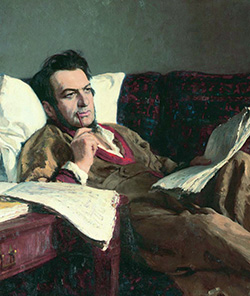Mikhail Glinka
pianosintheparks.com – Mikhail Ivanovich Glinka (Russian: Михаил Иванович Глинка, romanized: Mikhail Ivanovich Glinka, IPA: [mʲɪxɐˈil ɨˈvanəvʲɪdʑ ˈɡlʲinkə] ; 1 June [O.S. 20 May] 1804 – 15 February [O.S. 3 February] 1857) was the first Russian composer to gain wide recognition within his own country and is often regarded as the fountainhead of Russian classical music.[2] His compositions were an important influence on other Russian composers, notably the members of The Five, who produced a distinctive Russian style of music.
See More :

Mikhail Glinka (1804-1857), the “father of Russian music” was born in Smolensk in western Russia. He studied composition in Italy and Berlin around his thirties, after having begun his career as a government official. Returning to Russia, he looked on his national heritage with new eyes, and rediscovered the works of writers such as Pushkin and Gogol. This new love for his homeland inspired him to write what would become one of the great Russian classics, the opera A Life for the Tsar, which combined Russian and Polish folk tunes with the procedures of Italian and French opera. Glinka’s second opera, Ruslan and Lyudmila, contains influences from Persian music and is remarkable for its use of the whole-tone scale, which until then had not appeared in European music. Throughout his life Glinka wrote piano music (variation sets, various dances et cetera) which can come rather close to Chopin´s sound world, probably because of the two composers´ common roots in the music of John Field.
| Title | Key | Year | Level | |
|---|---|---|---|---|
All pieces: |
||||
| Russian Dance | D Minor | – | 2 | |
| Petite Mazurka | A Minor | 1852 | 7 | |
| L’Alouette | B-flat Minor | 1864 | 8+ | |



Leave a Reply
Want to join the discussion?Feel free to contribute!